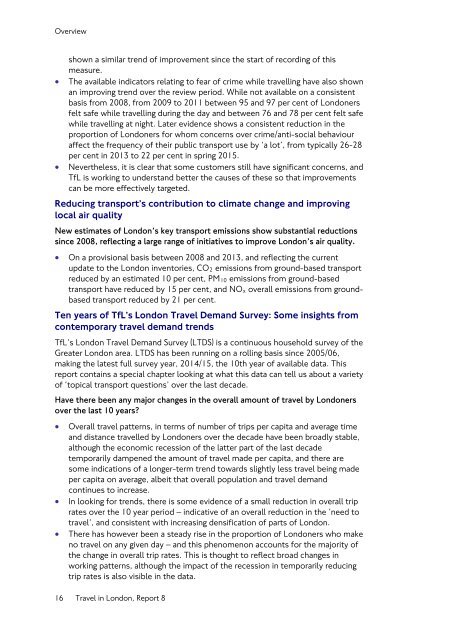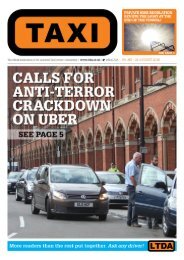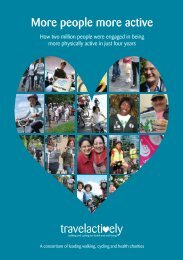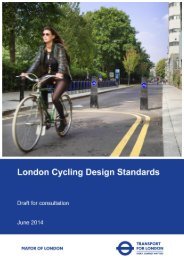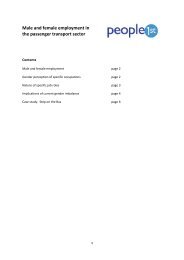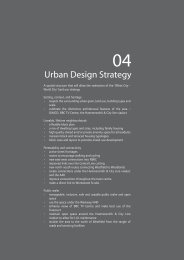Travel in London Travel in London
travel-in-london-report-8
travel-in-london-report-8
You also want an ePaper? Increase the reach of your titles
YUMPU automatically turns print PDFs into web optimized ePapers that Google loves.
Overview<br />
shown a similar trend of improvement s<strong>in</strong>ce the start of record<strong>in</strong>g of this<br />
measure.<br />
• The available <strong>in</strong>dicators relat<strong>in</strong>g to fear of crime while travell<strong>in</strong>g have also shown<br />
an improv<strong>in</strong>g trend over the review period. While not available on a consistent<br />
basis from 2008, from 2009 to 2011 between 95 and 97 per cent of <strong>London</strong>ers<br />
felt safe while travell<strong>in</strong>g dur<strong>in</strong>g the day and between 76 and 78 per cent felt safe<br />
while travell<strong>in</strong>g at night. Later evidence shows a consistent reduction <strong>in</strong> the<br />
proportion of <strong>London</strong>ers for whom concerns over crime/anti-social behaviour<br />
affect the frequency of their public transport use by ‘a lot’, from typically 26-28<br />
per cent <strong>in</strong> 2013 to 22 per cent <strong>in</strong> spr<strong>in</strong>g 2015.<br />
• Nevertheless, it is clear that some customers still have significant concerns, and<br />
TfL is work<strong>in</strong>g to understand better the causes of these so that improvements<br />
can be more effectively targeted.<br />
Reduc<strong>in</strong>g transport’s contribution to climate change and improv<strong>in</strong>g<br />
local air quality<br />
New estimates of <strong>London</strong>’s key transport emissions show substantial reductions<br />
s<strong>in</strong>ce 2008, reflect<strong>in</strong>g a large range of <strong>in</strong>itiatives to improve <strong>London</strong>’s air quality.<br />
• On a provisional basis between 2008 and 2013, and reflect<strong>in</strong>g the current<br />
update to the <strong>London</strong> <strong>in</strong>ventories, CO 2 emissions from ground-based transport<br />
reduced by an estimated 10 per cent, PM 10 emissions from ground-based<br />
transport have reduced by 15 per cent, and NO x overall emissions from groundbased<br />
transport reduced by 21 per cent.<br />
Ten years of TfL’s <strong>London</strong> <strong>Travel</strong> Demand Survey: Some <strong>in</strong>sights from<br />
contemporary travel demand trends<br />
TfL’s <strong>London</strong> <strong>Travel</strong> Demand Survey (LTDS) is a cont<strong>in</strong>uous household survey of the<br />
Greater <strong>London</strong> area. LTDS has been runn<strong>in</strong>g on a roll<strong>in</strong>g basis s<strong>in</strong>ce 2005/06,<br />
mak<strong>in</strong>g the latest full survey year, 2014/15, the 10th year of available data. This<br />
report conta<strong>in</strong>s a special chapter look<strong>in</strong>g at what this data can tell us about a variety<br />
of ‘topical transport questions’ over the last decade.<br />
Have there been any major changes <strong>in</strong> the overall amount of travel by <strong>London</strong>ers<br />
over the last 10 years?<br />
• Overall travel patterns, <strong>in</strong> terms of number of trips per capita and average time<br />
and distance travelled by <strong>London</strong>ers over the decade have been broadly stable,<br />
although the economic recession of the latter part of the last decade<br />
temporarily dampened the amount of travel made per capita, and there are<br />
some <strong>in</strong>dications of a longer-term trend towards slightly less travel be<strong>in</strong>g made<br />
per capita on average, albeit that overall population and travel demand<br />
cont<strong>in</strong>ues to <strong>in</strong>crease.<br />
• In look<strong>in</strong>g for trends, there is some evidence of a small reduction <strong>in</strong> overall trip<br />
rates over the 10 year period – <strong>in</strong>dicative of an overall reduction <strong>in</strong> the ’need to<br />
travel’, and consistent with <strong>in</strong>creas<strong>in</strong>g densification of parts of <strong>London</strong>.<br />
• There has however been a steady rise <strong>in</strong> the proportion of <strong>London</strong>ers who make<br />
no travel on any given day – and this phenomenon accounts for the majority of<br />
the change <strong>in</strong> overall trip rates. This is thought to reflect broad changes <strong>in</strong><br />
work<strong>in</strong>g patterns, although the impact of the recession <strong>in</strong> temporarily reduc<strong>in</strong>g<br />
trip rates is also visible <strong>in</strong> the data.<br />
16 <strong>Travel</strong> <strong>in</strong> <strong>London</strong>, Report 8


